The Heart Institute: “Guidelines for Lowering Triglycerides and Raising HDL Cholesterol.”
Foods to Boost Leptin
The discovery of leptin in 1994 caused a lot of excitement as scientists hoped they could use it to help people control their weight. Leptin is a hormone secreted by fat cells that affects the way the body stores and burns energy. It is sometimes known as a satiety drug because it reduces appetite.
Researchers soon learned some facts about leptin that debunked their original assumptions. They found that people with obesity had plenty of leptin in their bodies but still gained weight. They presumed that people who are overweight may have a condition called leptin resistance. Researchers also learned that leptin supplements don’t work since they can’t get past the blood-brain barrier and are metabolized by the body.
Why You Need Leptin
In addition to regulating appetite, leptin has been found to play many roles in the body, including boosting the immune system, reducing inflammation, and creating healthy bones. However, these roles require additional research to be fully supported.
Leptin works in combination with another hormone, ghrelin, which signals hunger. Together these are called the hunger hormones since they control how often and how much you want to eat. Yet, scientists think that leptin plays a more important role than ghrelin.
Although supplements of leptin were found ineffective for weight control, doctors treat a few conditions with injections of a synthetic form of leptin, including:
Congenital Leptin Deficiency
Congenital leptin deficiency results in uncontrolled hunger. It is usually discovered early in life when children exhibit severe obesity and delayed puberty. Injections of a leptin analog are effective in controlling this condition.
Generalized Lipodystrophy
Generalized lipodystrophy is a serious condition in which individuals have almost no body fat. Often they accumulate fat in their organs, and may develop metabolic health risks such as diabetes. Because they have few fat cells, people with this condition don’t produce enough leptin. Therefore, they are treated with injections of a synthetic leptin.
Foods With Leptin
Most food sources do not effectively make leptin available for your brain, so there is little point in looking for food sources with it. Instead, it is recommended to speak with your healthcare provider and discuss including a satiety drug in your routine as well as making lifestyle changes to increase your body’s leptin levels.
In order for leptin to work properly in the body, you need plenty of high-quality sleep. One study found that people who were sleep-deprived had high levels of ghrelin, which makes you hungry, and lower levels of leptin, which makes you feel satisfied.
Your choice of food is also important. Today researchers are looking at the relationship between leptin and triglycerides, a type of fat also known as lipids. Research shows that high triglycerides seem to impact the way leptin works in the body. A diet that is designed to lower triglycerides could help to boost leptin in your body.
Load up on these nine foods to lower your body’s triglycerides levels so that can help leptin work more effectively in your body:
- Berries
Replace sugary treats with fruit in its natural form. Berries like blueberries, blackberries, and strawberries are lower in sugar than some other fruits and can help to lower your triglyceride levels. - Unsweetened Beverages
Experiment with herbal, black, or green teas, or drink water with lemon or a fruit infusion to lower your triglycerides levels and boost leptin in your body. - Healthy Oils
When cooking, use moderate amounts of canola oil, olive oil, or high-oleic sunflower oil for most uses. Flaxseed oil is also a good choice for non-cooking uses. - Vegetables
Eating vegetables raw, steamed, or roasted is a great way to lower your triglyceride levels. Choose kale or cauliflower instead of starchy vegetables like corn or potatoes. - Legumes
Beans, peas, and lentils are great sources of protein and fiber that can boost the functionality of leptin in your body. Try to avoid baked beans and others with added sugar. - Lean Meat, Poultry, and Fish
Fish is the best choice for lowering triglycerides. If you choose other animal proteins, moderate your servings to about 3 ounces and prepare with a healthy oil for added benefits. - Whole Grains
Try brown rice instead of white and whole-grain breads instead of refined loaves. Also consider switching to whole-grain pasta or a healthier version like those made from chickpeas to lower triglycerides levels. - Salad Greens
Don’t forget to eat your greens! Power up the toppings, and consider salad dressings low in salt, sugars, and fats. - Mushrooms
Mushrooms are high in nutrients and low in calories, which can help to regulate your triglyceride levels and boost leptin in your body.
Show Sources
Diabetes: “Triglycerides induce leptin resistance at the blood-brain barrier.”
Expert Review of Clinical Pharmacology: “Metreleptin for injection to treat the complications of leptin deficiency in patients with congenital or acquired generalized lipodystrophy.”
The Heart Institute: “Guidelines for Lowering Triglycerides and Raising HDL Cholesterol.”
Hormone Health Network: “What is Leptin?”
PLoS Medicine: “Short sleep duration is associated with reduced leptin, elevated ghrelin, and increased body mass index.”
University Health News Daily: “What Is Leptin?”
How to Increase Leptin (Your Fat-Burning Switch) & Fight Resistance
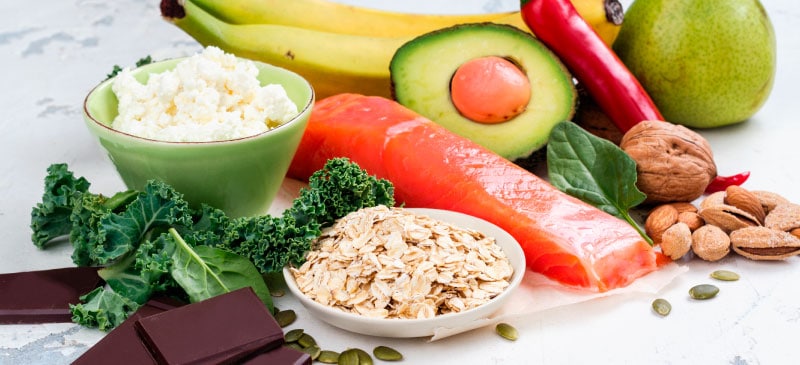
A major topic in the field of obesity research is the link between obesity and the hormone leptin. Some evidence suggests that obese-prone individuals don’t respond to increasing leptin levels in the same way that non-obese-prone individuals do, which is the reason obesity is now being associated with possible “leptin resistance.”
Scientists first discovered leptin in 1994, after years of research focused on hormones that affect body weight and calorie intake. While initially researchers believed the discovery could be used to create powerful weight loss supplements, this has never happened.
How does leptin function in the body and where does the hormone come from? Leptin interacts with areas of the brain that control hunger and eating behavior. The nickname “the starvation hormone” has been given to leptin because levels tend to plummet when someone restricts their calorie intake too much, exercises more and loses body fat. These are all factors involved in what’s called “starvation mode.” (Meanwhile, ghrelin is called a “hunger hormone” that increases your desire to eat.)
At your ideal “set point weight,” adipose (fat) cells produce a given amount of leptin, which maintains the internal energy balance needed for necessary cellular function and proper weight management. In most healthy adults, changes in body weight will trigger changes in leptin, causing appetite to either increase when body fat falls or decrease when body fat rises — although in some susceptible individuals this energy-balance system seems to malfunction.
There’s still a lot to learn about how leptin resistance (or decreased sensitivity to leptin’s signals) develops, and what can be done to prevent or reverse it. Many experts believe that eating a highly processed, highly “palatable” diet — especially while also leading a stressful and mostly sedentary lifestyle — is the perfect storm for developing leptin resistance.
Even if someone is genetically susceptible to weight gain or obesity, there’s still a lot they can do to help prevent this from happening, especially eating a nutrient-dense diet, getting enough exercise and taking steps to manage stress.
What Is the Leptin Hormone?
The definition of leptin is a peptide hormone that is produced by fat cells. By acting on the hypothalamus to suppress appetite and burn fat stored in adipose tissue, it plays a role in body weight regulation.
Leptin is known as the starvation hormone (or sometimes the “satiety hormone”) because it notifies your brain if you have eaten enough and your energy levels (calorie intake) are sufficient, or if your energy intake needs to increase. A number of factors can influence leptin and ghrelin levels, including:
- Calorie intake
- Meal timing
- Sleep/wake schedule and sleep duration (both linked to your circadian rhythm)
- Light exposure
- Exercise
- Stress
The main regulator of leptin production is body fat (or adipose tissue). Levels fluctuate depending on your current weight, especially your percentage of body fat. Leptin is produced mainly by adipocytes (fat cells), which is why levels of leptin usually increase when someone gains more body fat, and decrease when someone loses weight. Leptin also plays an important role in the regulation of the reproductive system, thyroid gland, adrenal glands and growth hormone production.
Leptin does its job by binding to and activating receptors in the brain known as LEPR-B receptors. When leptin levels go up, your hunger should decrease, while at the same time you start consciously and unconsciously increasing energy expenditure (the amount of “calories burned”). This feedback system helps most people to prevent too much weight gain.
How is leptin different than ghrelin?
Leptin and ghrelin are two of the many hormones that help to regulate your metabolism, appetite and body weight. While leptin is considered the main”satiety hormone” because it helps control your appetite, ghrelin is considered the main “hunger hormone” because it increases your desire to eat.
When levels of ghrelin and leptin are disrupted, your ability to eat when you are truly hungry and stop when you are full can become severely compromised, leading to changes in body weight and other related consequences. Even though these two hormones have opposite effects, working together in a checks-and-balances type of way, diet and lifestyle changes that help to regulate leptin are also helpful for controlling ghrelin.
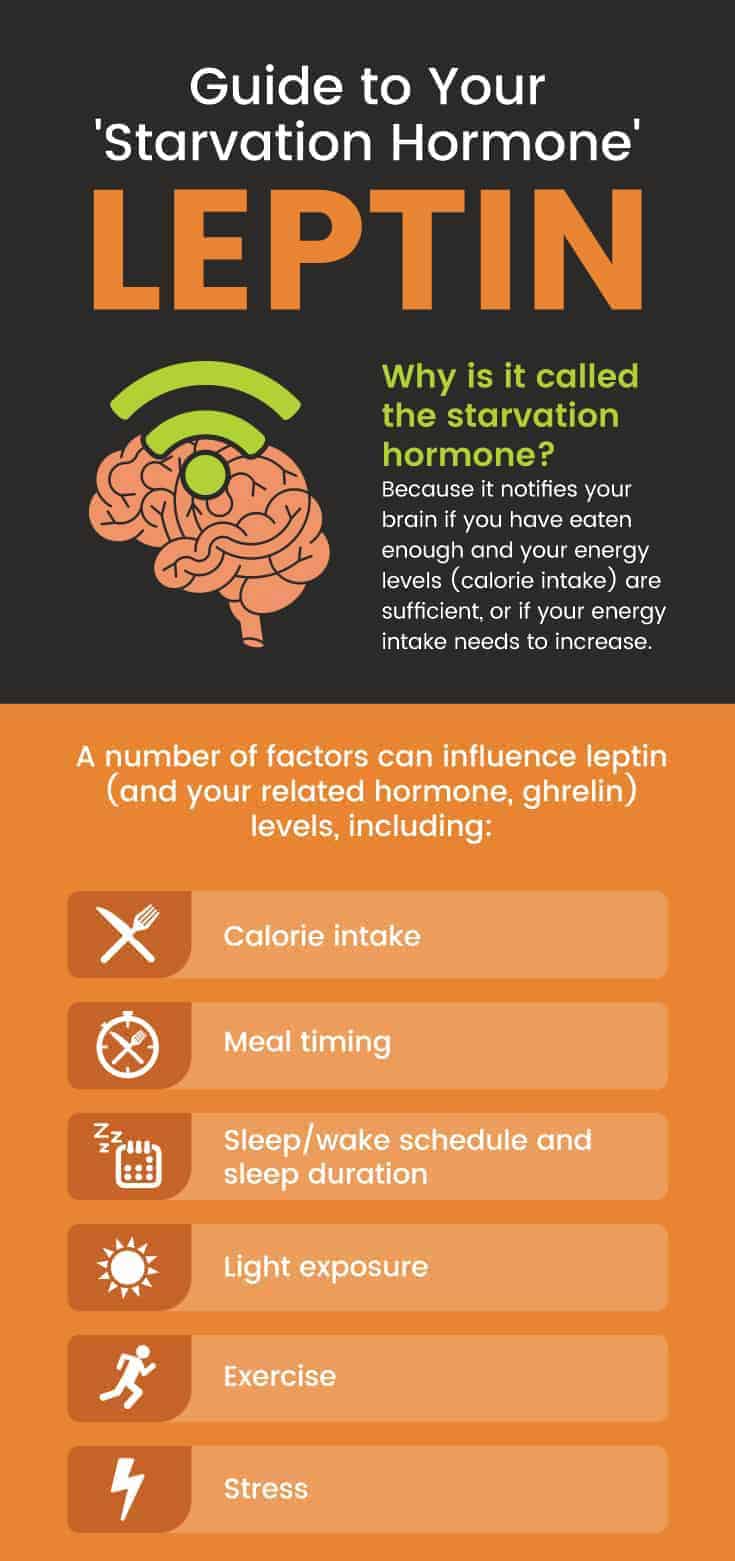
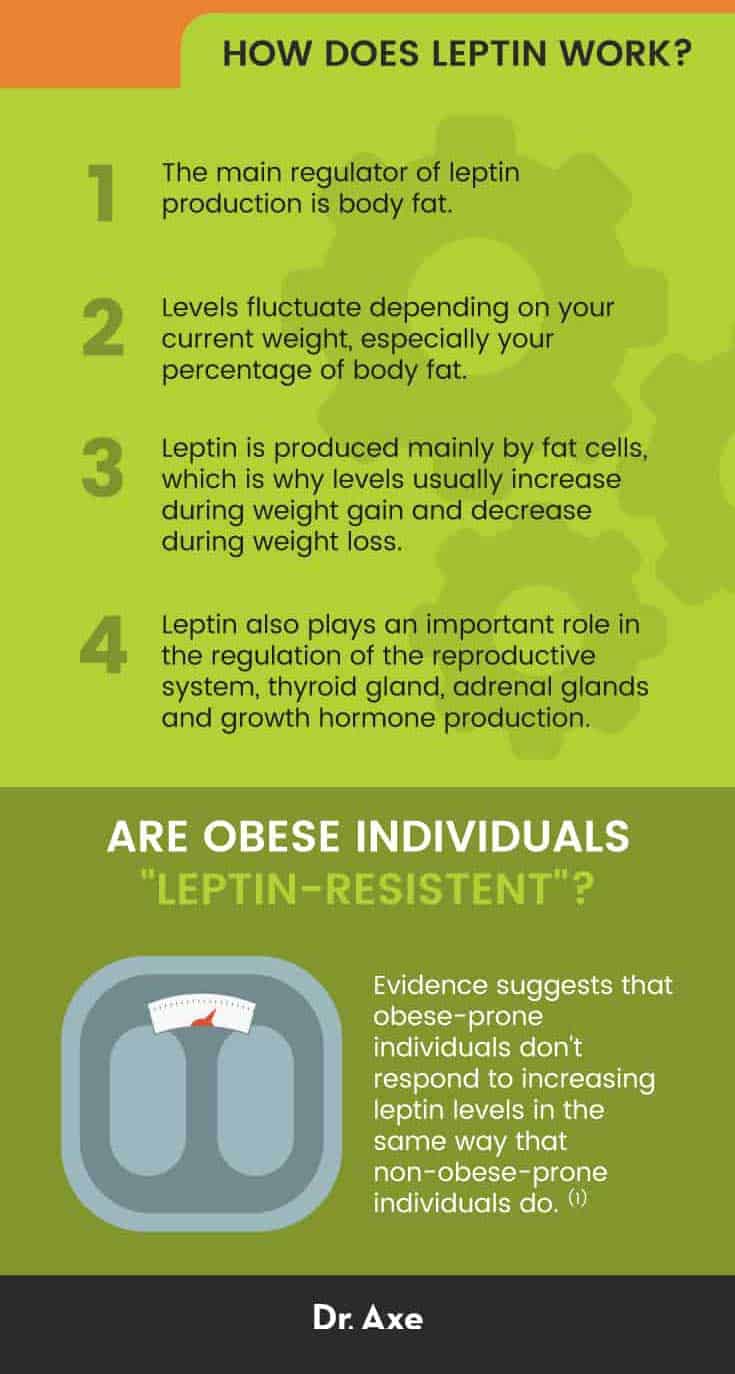
Leptin Resistance and Obesity
What do studies suggest is the relationship between obesity and leptin? The National Institutes of Health uses the following clinical definition of leptin resistance: “The failure of endogenous or exogenous leptin to promote anticipated salutary metabolic outcomes in states of over-nutrition or obesity.” In other words, leptin resistance has been described as when your “brain is starving but your body is obese.”
As described above, weight gain typically causes blood leptin levels to increase, and weight loss typically results in decreased levels. But this is not the case with leptin resistance, which may contribute to a vicious cycle of weight gain. Someone who is resistant to leptin is not sensitive enough to the hormone’s signals. Studies show that being leptin resistant can mean that someone requires more food than necessary to feel “full” or satiated, due to the brain not receiving the message that enough food (calories) has already been eaten.
- Although it’s still not exactly clear how, experts believe that obesity alters multiple cellular processes that interfere with normal leptin signaling.
- Leptin resistance itself might not directly cause obesity, but it may contribute to cellular changes that make weight gain more likely when combined with genetic and environmental factors.
- For example, certain gene mutations seem to cause a greater desire for energy-dense foods (such as highly processed, junk foods) that can promote obesity. Obesity may then contribute to chronic low-level inflammation, insulin resistance and other health problems that make weight loss more difficult. This is because inflammation and its consequences decreases leptin sensitivity in the part of the brain called the hypothalamus.
Leptin resistance is a difficult phenomenon to treat, mainly because the human body seems to want to hold onto excess body fat more than it wants to lose it. It’s now believed that a major protective role of leptin is to defend against reductions of body fat that might cause a threat to survival and future reproduction.
This might seem counterproductive, since it increases the risk for obesity — but it makes sense when you think about our ancestors who were at a much greater risk of under-eating and starving, than overeating and becoming obese. Research shows that the body has more powerful ways of defending against starvation (low leptin levels) by producing strong hunger responses than it does defending against weight gain (excess calorie intake and high leptin).
How to Boost Leptin
How do you increase (or decrease) your leptin levels? Keep in mind that your leptin levels are not the only factor that controls your body weight; other influencers include your: overall diet, genetics, age, gender, level of activity, medical history and gut health.
However, research suggests that the dietary choices, habits and lifestyle changes described below can help to regulate levels of leptin and allow you to more easily maintain a healthy body weight:
1. Follow a Leptin Diet
Is there such a thing as “high-leptin foods”? Foods that are very satiating (the kinds that make you feel full) can be considered the best types for improving leptin sensitivity.
Two popular topics regarding obesity and leptin resistance are 1) food palatability and 2) food reward. Food palatability refers to the taste and feel provided by various foods and drinks, while food reward refers to the pleasure and momentary value of a food at the time that it’s being consumed. Both food palatability and food reward have a major impact on neural pathways that control calorie intake.
The rewarding aspects of food, how palatable and preferred they are, are controlled by circuitry central nervous system (CNS) pathways that also control leptin and ghrelin. When a food is calorie-dense and highly processed, it causes chemical changes in the brain that increase the desire to eat. This is why eating whole foods and an unprocessed diet is considered to be so important for appetite regulation.
Which foods should you not eat in order to balance leptin?
Foods that are most likely to interfere with normal leptin and ghrelin levels are those that are high in refined grains, added sugar, added fats, artificial flavors or sweeteners, and other synthetic ingredients, especially when a number of these attributes are combined together.
Studies suggest that examples of processed, inflammatory foods to limit or avoid in order to regulate your hunger and satiety hormones include: sweets like cakes, donuts, cookies, pastries, brownies and other desserts, soda and sweetened beverages, pizza, white bread, rolls, wraps, pita, chocolate, candy and ice cream, salty snacks like chips, pretzels and french fries, processed meats and fried foods.
Meanwhile, these foods can help to make you feel fuller and more satisfied after eating and between meals, reducing the chances that you’ll overeat:
- High-fiber/high-volume foods (especially all types of fresh and cooked vegetables) — Low-density foods (high in volume, water and fiber) are those that provide the highest nutritional bang for your buck, since they provide lots of nutrients but have the lowest amount of calories. Examples are veggies, fresh fruit, salads, broth-based soups, beans, legumes and whole grains. Many of these are high-fiber foods that help control hunger, prevent overeating and increase mealtime satisfaction.
- High-protein foods — Since protein helps control hunger and retain lean muscle mass, increasing your protein intake can help you eat less overall and keep your metabolism up. Include protein with every meal, like yogurt, grass-fed beef, wild fish, egg, pasture-raised poultry, legumes and beans.
- Healthy fats — Fats are more calorie-dense, but they are necessary for nutrient absorption, making meals taste good and for controlling hunger hormones. A meal without any fat is unlikely to taste very appealing or to keep you full for very long. Try to include at least a small serving of healthy fat with every meal, such as coconut or olive oil, avocado, nuts, seeds or fat found naturally in animal products like dairy, beef or eggs. Using a little MCT oil alongside a protein powder in your smoothies as well.
2. Alternate Day Calorie Cycling and Intermittent Fasting (or Time-Restricted Feeding)
Various forms of intermittent fasting, including alternate day cycling and time-restricted eating, have been associated with improvements in leptin sensitivity and help with fat loss. Experts claim that fasting may help to control local inflammation in the hypothalamic nuclei (the area of the brain that controls energy intake and expenditure), which contributes to a sustained energy balance and protection against obesity.
One study found evidence that intermittent fasting combined with resistance training could improve health-related biomarkers, decrease fat mass and maintain muscle mass in mostly healthy male participants. After eight weeks of time-restricted feeding (16 hours fasting per day with an eight-hour feeding window), participants experienced a decrease in fat mass, while fat-free mass (measured as muscle area of the arm and thigh) was unchanged.
Testosterone, insulin-like growth factor and leptin levels decreased significantly in those who were practicing time-restricted feeding, but there was no negative effect on energy expenditure. Considering that a decrease in leptin levels is usually thought to decrease someone’s metabolic rate, this is a very promising finding. The researchers also found that the participants’ thyroid-stimulating hormone, total cholesterol, high-density lipoprotein, low-density lipoprotein and triglycerides mostly remained unchanged.
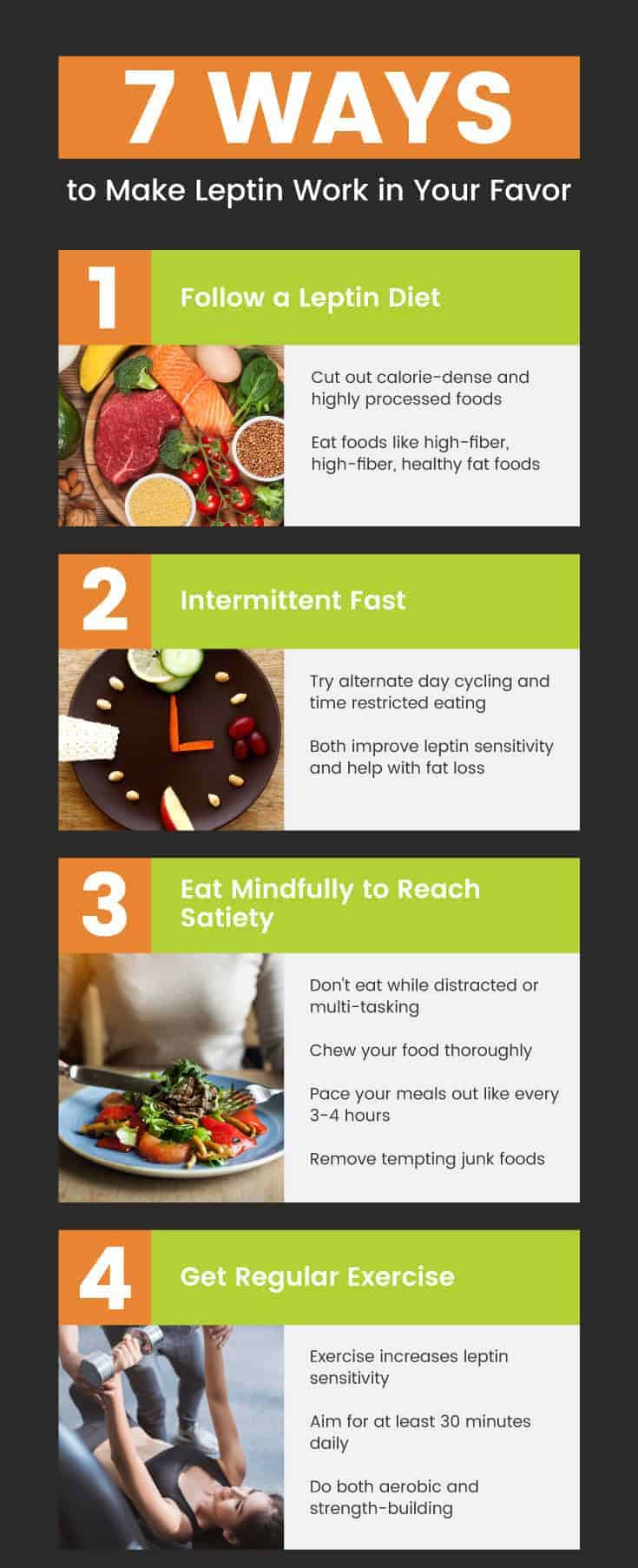
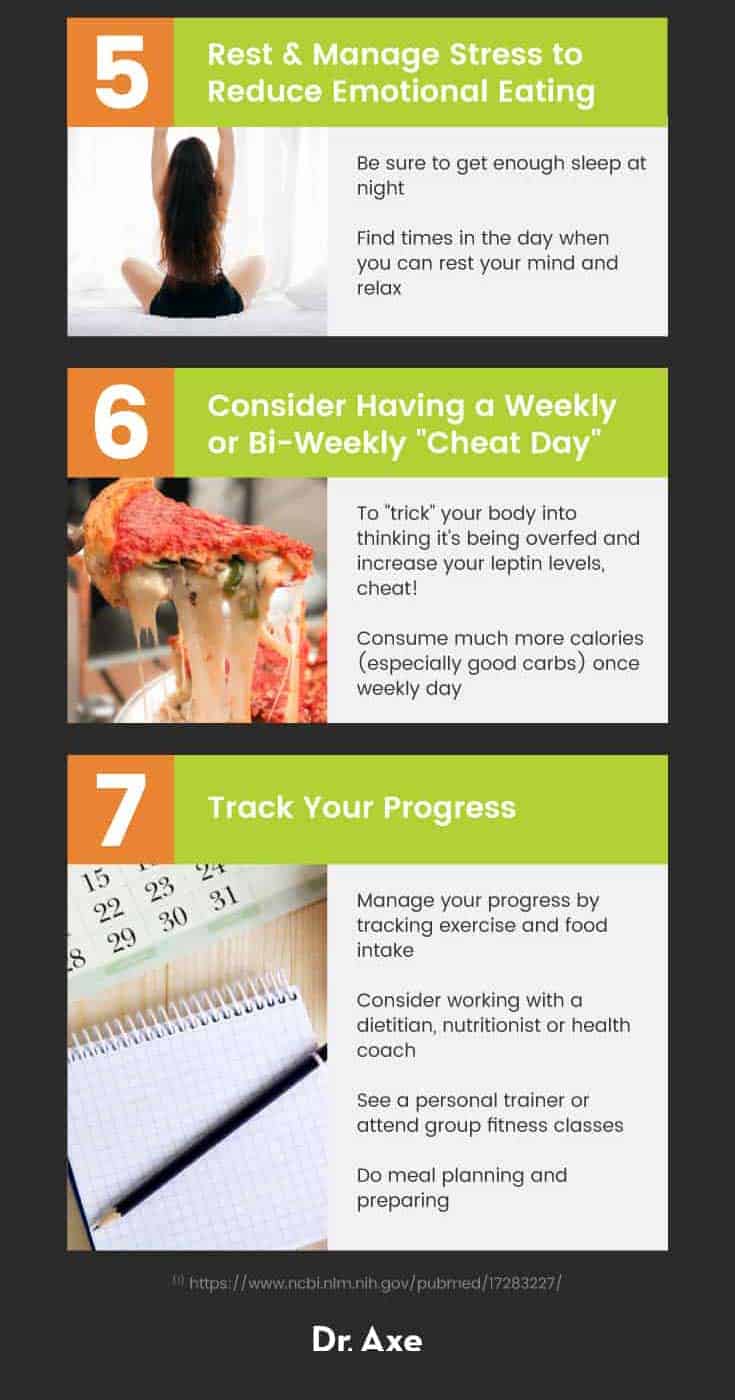
3. Eat Mindfully to Reach Satiety
How, when, where and with whom you eat can all influence how much you eat and how satisfied you feel afterwards. Here are tips that can help you eat more mindfully, feel more satisfied (full and content) after eating for at least several hours, and help you to avoid overindulging:
- Don’t eat while distracted or multi-tasking.
- Slow down, chewing your food thoroughly.
- Pace your meals out if this keeps you on track, so you’re eating something every 3–4 hours rather than only 1–2 times per day.
- Fill half your plate with high-volume veggies or fruit so you feel like you’re eating more.
- Cook more at home, then sit down to enjoy your meals peacefully.
- Don’t drink calorie-dense juices, soda or alcoholic drinks; try to stick with plain water, tea or black coffee.
- Start your meal with a broth-based soup or a salad in order to ease hunger before the main course.
- Remove tempting junk foods from your environment as much as possible, especially at home or in your office.
4. Get Regular Exercise
Exercise is one of the best ways to build lean muscle mass, improve your metabolism and increase leptin sensitivity (similarly to how it improves insulin sensitivity). As your physical activity level goes up, so does your metabolic rate and ability to regulate leptin. Even in people who seem to have a genetic predisposition to weight gain, exercise can still be highly protective.
By building strength and muscle mass, exercise helps to divert calories away from being stored as body fat so they can be used to grow and repair lean tissue instead. It also promotes the release of growth hormones, adrenaline and testosterone, all of which enable fat to be used as energy and mobilized rather than stored. In an age when rates of diabetes and heart disease are extremely high, exercise remains one of the best ways to promote the use of glucose (sugar) and fatty acids in the blood so they don’t wind up causing metabolic problems.
It’s been found that people who exercise regularly have increased protection against developing dangerous visceral fat and are typically healthier overall compared to non-exercisers. In fact, even if exercise doesn’t cause weight loss, it still has many positive effects! Exercise is a natural stress-buster, considering it helps regulate hormones and causes an “endorphin rush,” which can reduce the need for unhealthy coping mechanisms like overeating. It’s beneficial for regulating blood pressure, insulin and glucose levels, cholesterol and so on.
How much exercise is enough? Aim for at least 30 minutes daily, but ideally more like 45–60 minutes. A combination of aerobic and strength-building exercises is best. Try to incorporate high-intensity interval training (HIIT workouts) and burst training into your routine to maximize the metabolic benefits. HIIT, which involves sprinting and vigorous bursts of movement, offers a ton of proven benefits in less time compared to doing steady-state cardio exercise.
While exercise has many metabolic benefits, be aware that too much exercise will lower leptin levels and usually increase appetite. Some studies have found that long duration exercise (ranging from one to multiple hours) will interrupt leptin production and secretion. Exercise needs to be balanced with rest and recovery, because depending on the person, overtraining can lead to many problems associated with metabolic damage and low leptin, such as infertility, hypothyroidism, sexual dysfunction and irregular periods.
5. Rest and Manage Stress to Reduce Emotional Eating
Even when someone has required their nutritional and calorie needs, they are still prone to overeating and weight gain if they are chronically stressed. Studies have found associations between high stress levels, including high cortisol levels or symptoms tied to depression or anxiety, and increased weight gain.
To keep stress hormones like cortisol in check and prevent inflammation related to chronic stress, be sure to get enough sleep at night, and also to carve out periods in the day when you can rest your mind and relax. Do at least one thing (or more) that relaxes you each day, such as exercising, meditating, praying, stretching or doing yoga, taking a bath with essential oils, reading, journaling or doing something social.
When you are feeling stressed, be mindful about whether you’re eating for emotional reasons. Try speaking to someone who can help keep you accountable for your actions and on the right track, such a friend, spouse or counselor.
6. Consider Having a Weekly or Bi-Weekly “Cheat Day”
When you’re in a calorie deficit, exercising often and leading weight, your leptin levels decrease. This reduction in leptin levels can make it difficult to keep losing weight, even if you’re still eating less. That’s because it causes your metabolism to slow down, so you require even fewer calories to just maintain the same weight.
A cheat day is a once weekly, or sometimes once bi-weekly, day when you typically consume much more calories (especially carbs) than you normally eat. Cheat days are meant to be used as a helpful tool when you normally follow a very healthy diet. They work by increasing your calorie intake temporarily, which “tricks” your body into thinking it’s being overfed, causing an increase in your leptin levels.
Several small studies have found positive results from cheat days/temporary overeating, including increases in metabolic rate and help with long-term dieting. Because cheat days help to keep your metabolism up, they may also help with weight loss long-term, even if they lead to temporary gains or stalls in the short-term.
7. Track Your Progress
Studies have found that most people who have been able to lose weight and keep it off — such as those who are registered with the National Weight Control Registry — are careful about managing their progress, keeping up with exercise and even tracking their food intake. You don’t necessarily have to count calories to prevent weight gain, but you might want to keep some type of food journal if you find this helps keep you accountable.
Other ways that you can keep track of your health-related goals and progress include:
- Working with a dietitian, nutritionist or health coach.
- Seeing a personal trainer or attending group fitness classes.
- Finding a buddy to regularly walk or run with.
- Setting a schedule for your week so you make some to grocery shop, cook and exercise.
- Meal planning and preparing, which helps you avoid eating out too much.
Precautions Regarding Leptin Supplements
You might think in order to increase leptin levels effectively, and help to prevent or reverse obesity, why don’t we just take leptin supplements? Obesity researchers have been asking the same question for years, but unfortunately studies carried out thus far suggest that leptin supplements are usually ineffective and also risky.
In rare cases, the use of leptin supplements may be helpful for certain people with genetic mutations who produce nearly zero leptin or who do not respond to its signals, but for the vast majority of people, these supplements are currently not a viable option. Instead, lifestyle changes are more appropriate.
Final Thoughts
- Leptin is a peptide hormone that is produced by fat cells that plays a role in body weight regulation. It does this by acting on the hypothalamus (a region in the brain that controls homeostasis) to suppress appetite and burn fat stored in adipose tissue (body fat).
- When levels of ghrelin (the main “hunger hormone”) and leptin are disrupted, your ability to eat when you are truly hungry and stop when you are full can become severely compromised, which sometimes leads to obesity.
- Ways to prevent leptin resistance and make leptin work in your favor include: eating a nutrient-dense diet (very little highly processed foods), getting enough exercise, tracking your progress, setting up a healthy food environment, eating mindfully, and taking steps to manage stress.






